2014 年福建厦门大学考博英语真题
Part I Vocabulary and Structure (15% )
Directions: There are 30 incomplete sentences in this part. For each sentence there
are four choices marked A, B,C and D. Choose the ONE answer that best completes
the sen-
tence. Then mark the corresponding letter on the Answer Sheet with a single line
through the center.
1. The village my grandfather grew up in is not far from the town.
A. what B. where C. wherever D. which
2. What’s your attitude his criticism?
A. against B. for C. towards D. in
3. If I had a car of my own,I it to your sister yesterday.
A. will lend B. would lend
C. should lend D. would have lent
4. The newcomers found it impossible to themselves to the climate sufficiently to
make permanent homes in the new country.
A. suit B. adapt C. regulate D. coordinate
5. It’s a program designed to mainly to 16 to 25 year olds.
A. include B. appreciate C. appeal D. conduct
6. The actress lives in a very fashionable of town.
A. position B. component C. quarter D. zone
�
7. The store displayed its most products in the front window.
A. model B. present C. distinctive D. favorite
8. Bob fails to attend the evening school. He sick,because he never asks for leave.
A. may be B. can be C. must be D. is
9. that my head had cleared, my brain was also beginning to work much better.
A. For B. Now C. Since D. Despite
10. the storm, the ship would have reached its destination on time.
A. But for B. In case of C. In spite of D. Because o£
11. A tyre when you pump air into it; it shrinks when the air is gone.
A. explores B. expands C. exploit D. exposes
12. We simply can’t compete with other companies we improve our engine design and
reduce the cost of production.
A. though B. unless C. lest D. provided
13. Criticism and self-criticism is necessary it helps us to find and correct our
mistakes.
A. by that B. at that C. on that D. in that
14. He wasn’t appointed chairman of the committee, not very popular with all its
members.
A. to be considered B. considering
C. being considered D. having considered
15. telling her again since she won’t listen to it?
�
A. What’s the point of B. How’s the point of
C. Where is the point in D. Is there the point for
16. To save money for my education,mother often took on more work than for her.
A. it was good B. what was good
C. was good D. being good
17. He denied to send out the signal at exactly 8 p. m.
A. having been telling B. being told
C. to be told D. having been told
18. Did it ever you that he could be the murderer?
A. occur to B. occur in C. happen to D. happen with
19. The professor sprang to his feet, a hand to his rosy, bald head.
A. covered B. clapping C. smashing D. hit
20. The explorers came forward with gifts of ducks and flour-cakes and troughs of
water for the horses to drink.
A. held in B. held with C. held under D. held up
21. Because of the of its ideas,the book was in wide circulation both at home and
abroad.
A. originality B. subjectivity C. generality D. ambiguity
22. With its own parliament and currency and a common for peace,the European Union
declared itselfin 11 official languages—open for business.
A. inspiration B. assimilation C. intuition D. aspiration
�
23. America has now adopted more ___ European-style inspection systems,and the
incidence of food poisoning is falling.
A. discrete B. solemn C. rigorous D. autonomous
24. Mainstream pro-market economists all agree that competition is an spur to
efficiency and innovation.
A. extravagant B. exquisite C. intermittent D. indispensable
25. In the late 19th century, Jules Verne, the master of science fiction, foresaw
many of the technological wonders that are today.
A. transient B. commonplace C. implicit D. elementary
26.1 was so when I used the automatic checkout lane in the supermarket for the first
time.
A. immersed B. assaulted C. thrilled D. dedicated
27. His arm was from the shark’s mouth and reattached, but the boy, who nearly died,
remained in a delicate condition.
A. retrieved B. retained C. repelled D. restored
28. Bill Gates and Walt Disney are two people the magazine has to be the Grea- test
American.
A. appointed B. appeased C. nicknamed D. nominated
29. The majority of citizens tend to believe that the death penalty will help decrease
the crime rate.
A. overflowing B. overwhelming C. prevalent D. premium
30. We will also see a increase in the number of televisions per household,as small
TV displays are added to clocks,coffee makers and smoke detectors.
�
A. startling B. surpassing C. suppressing D. stacking
Part H Reading Comprehension (30%)
Directions: There are three passages in this part. Each passage is followed by some
questions or unfinished statements. For each of them there are four choices marked
A, B, C
and D. You should decide on the best choice and mark the corresponding letter on
the Answer Sheet with a single line through the center.
Questions 31 to 35 are based on the following passage:
Pronouncing a language is a skill. Every normal person is expert in the skill of
pronouncing his own language, but few people are even moderately proficient at
pronouncing
foreign languages. Now there are many reasons for this,some obvious, some perhaps
not so obvious. But I suggest that the fundamental reason why people in general do
not speak foreign languages very much better than they do is that they fail to grasp
the true nature of the problem of learning to pronounce, and consequently never set
about dealing with it in the right way. Far too many people fail to realize that
pronouncing a foreign language is a skill, one that needs careful training of a
special kind, and one that cannot be acquired by just leaving it to take care of
itself. I think even teachers of language,while recognizing the importance of a
good accent, tend to neglect, in their practical teaching, the branch of study
concerned with speaking the language. So the first point I want to make is that
English pronunciation must be taught? the teacher should be prepared to devote some
of the lesson time to this, and by his whole attitude to the subject should get the
student to feel that here is a matter worthy of receiving his close attention. So,
there should be occasions when other aspects of English, such as grammar or spelling,
are allowed for the moment to take second place.
�
Apart from this question of the time given to pronunciation, there are two other
requirements for the teacher: the first, knowledge; the second,technique. It is
important that the teacher should be in possession of the necessary information.
This can generally be obtained from books. It is possible to get from books some
idea of the mechanics of speech,and of what we call general phonetic theory. It
is also possible in this way to get a clear mental picture of the relationship between
the sounds of different languages, between the speech habits of English people and
those, say, of your students. Unless the teacher has such a picture, any comments
he may make on his students’ pronunciation are unlikely to be of much use,and lesson
time spent on pronunciation may well be time wasted.
31. According to the passage,
pronouncing foreign languages.
A. few people are extremely good at
B. even modern people are not good at
C. only a few people are somewhat good at
D. few people are at the average level in
32. According to the author, pronunciation is a skill that can NOT be .
A. picked up without conscious training B. trained consciously
C. be taught D. be carefully trained
33. The italicized “the branch of study” in Para. 1 refers to •
A. accent B. pronunciation
C. the learning of spoken English D. both A and B
34. In the author’s opinion,
•
A. grammar is less important than pronunciation
�
B. grammar and spelling should always make room for pronunciation
C. grammar and spelling are sometimes less important than pronunciation
D. grammar is more important than spelling
35. Which of the following best states the main idea of the passage?
A. The difficulty and importance of pronunciation.
B. The difficulty and the teaching requirements concerning pronunciation.
C. The significance and the teaching methods of pronunciation.
D. The difficulty and features of pronunciation.
Questions 36 to 40 are based on the following passage:
What will man be like in the future—in 5,000 or even 50,000 years from now? We can
only make a guess, of course,but we can be sure that he will be different from what
he is
today. For man is slowly changing all the time. Let us take an obvious example. Man,
even five hundred years ago,was shorter than he is today. Now, on average, men are
about three inches taller. Five hundred years is a relatively short period of time,
so we may assume that man will continue to grow taller.
Again, in the modern world we use our brains a great deal. Even so,we still make
use of only about 20% of the brain’s capacity. As time goes on,however,we shall
have to use our brains more and more,and eventually we shall need larger ones! This
is likely to bring about a physical change too: the head,in particular the forehead,
will grow larger.
Nowadays our eyes are in constant use. In fact, we use them so much that very often
they become weaker and we have to wear glasses. But over very long period of time
it is
�
likely that man’s eyes will grow stronger. On the other hand, we tend to make less
use of our arms and legs. These,as a result, are likely to grow weaker. At the same
time, however, our fingers will grow more sensitive because they are used a great
deal in modern life.
But what about hair? This will probably disappear from the body altogether in course
of time because it does not serve a useful purpose any longer. In the future,then,
both se-
xes are likely to be bald! Perhaps all this gives the impression that future man
will not be a very attractive creature to look atj This may well be true. All the
same,in spite of all these changes,future man will still have a lot in common with
us. He will still be a human being, with thoughts and emotions similar to our own.
36. The passage tells us about .
A. how man’s life will be in the future
B. how future man will look like
C. the fact that man’s organs will function differently in the future
D. the fact that man is growing uglier as time passes
37. There is evidence that man is changing— •
A. man has been growing taller over the past five hundred years
B. man has got stronger eyes now than he ever had
C. man’s hair is getting thinner and thinner
D. man’s limbs are growing weaker because he tends to make less use of them
38. Man’s forehead will grow larger because .
A. he still makes use of only about 20% of the brain’s capacity
�
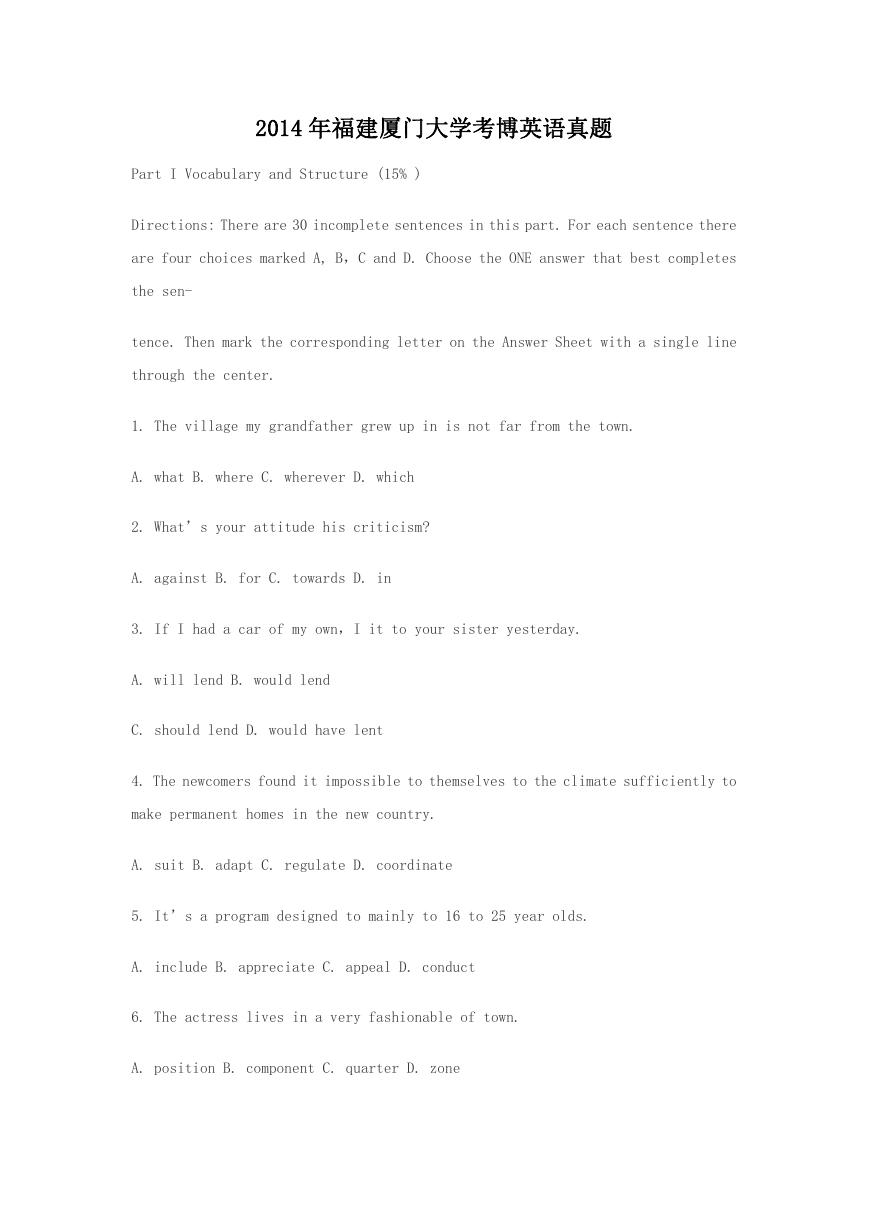
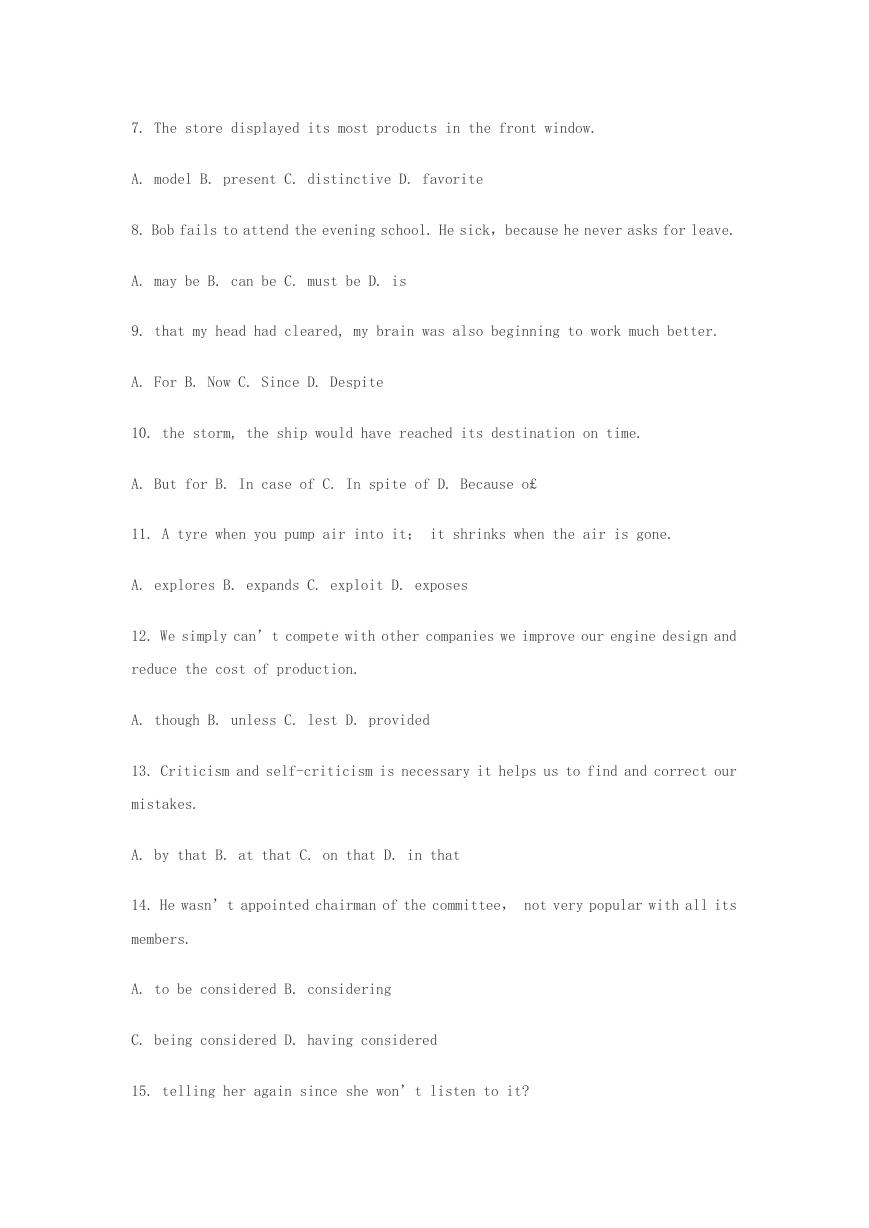
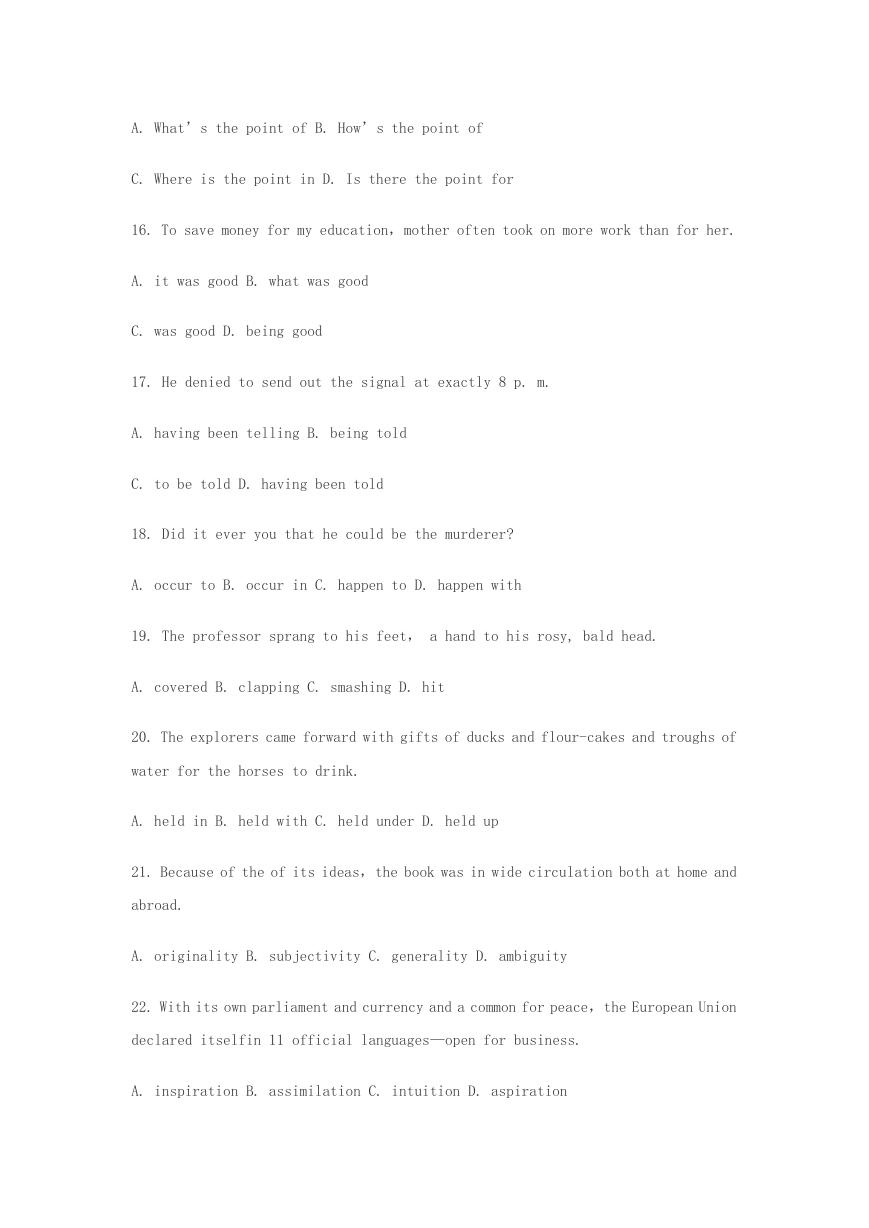
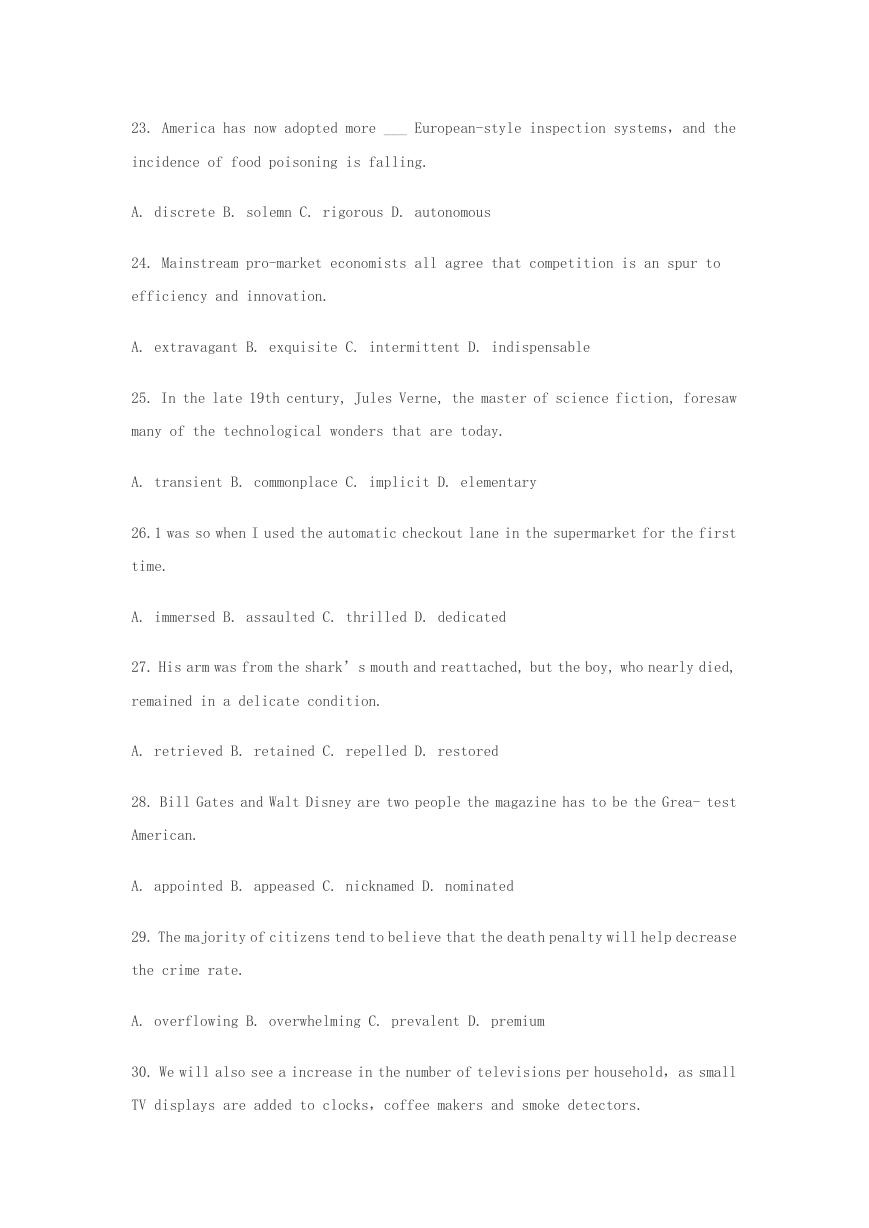


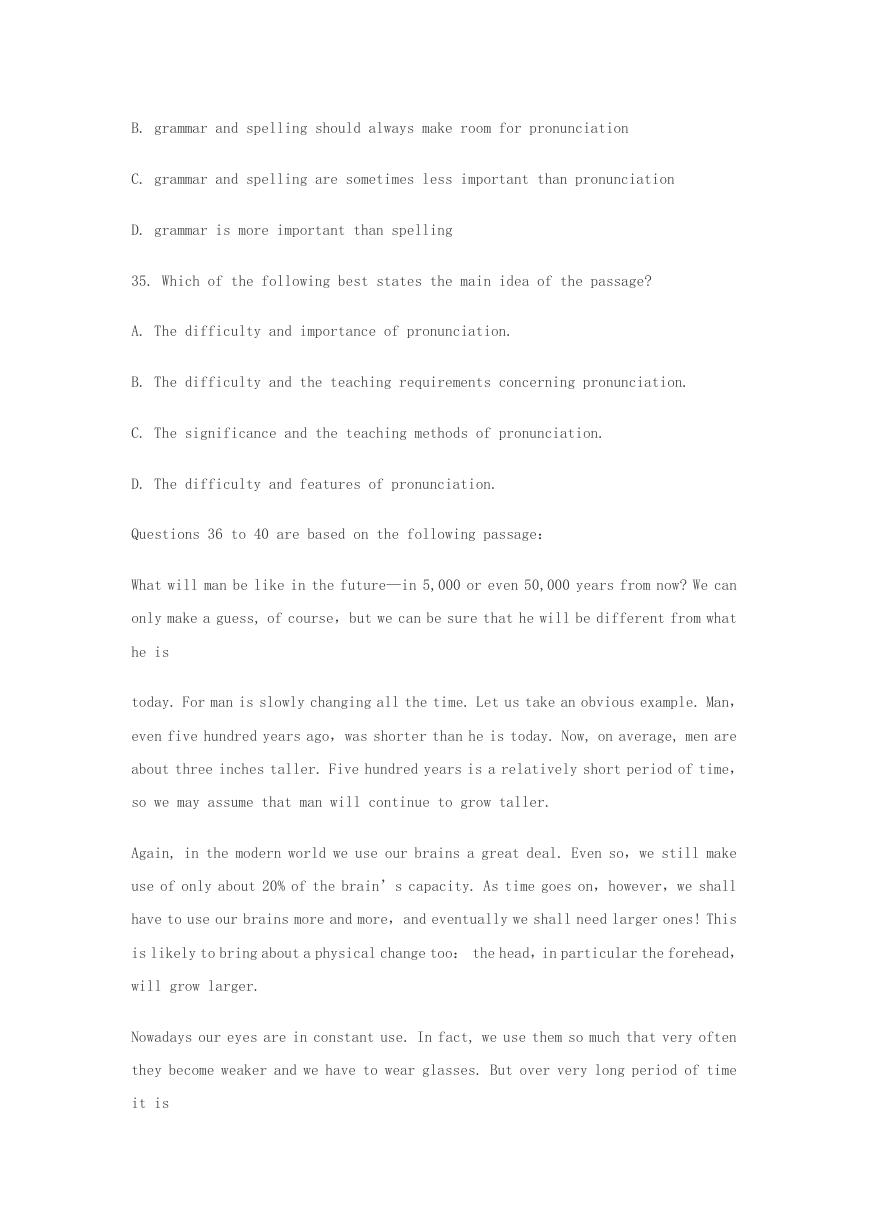
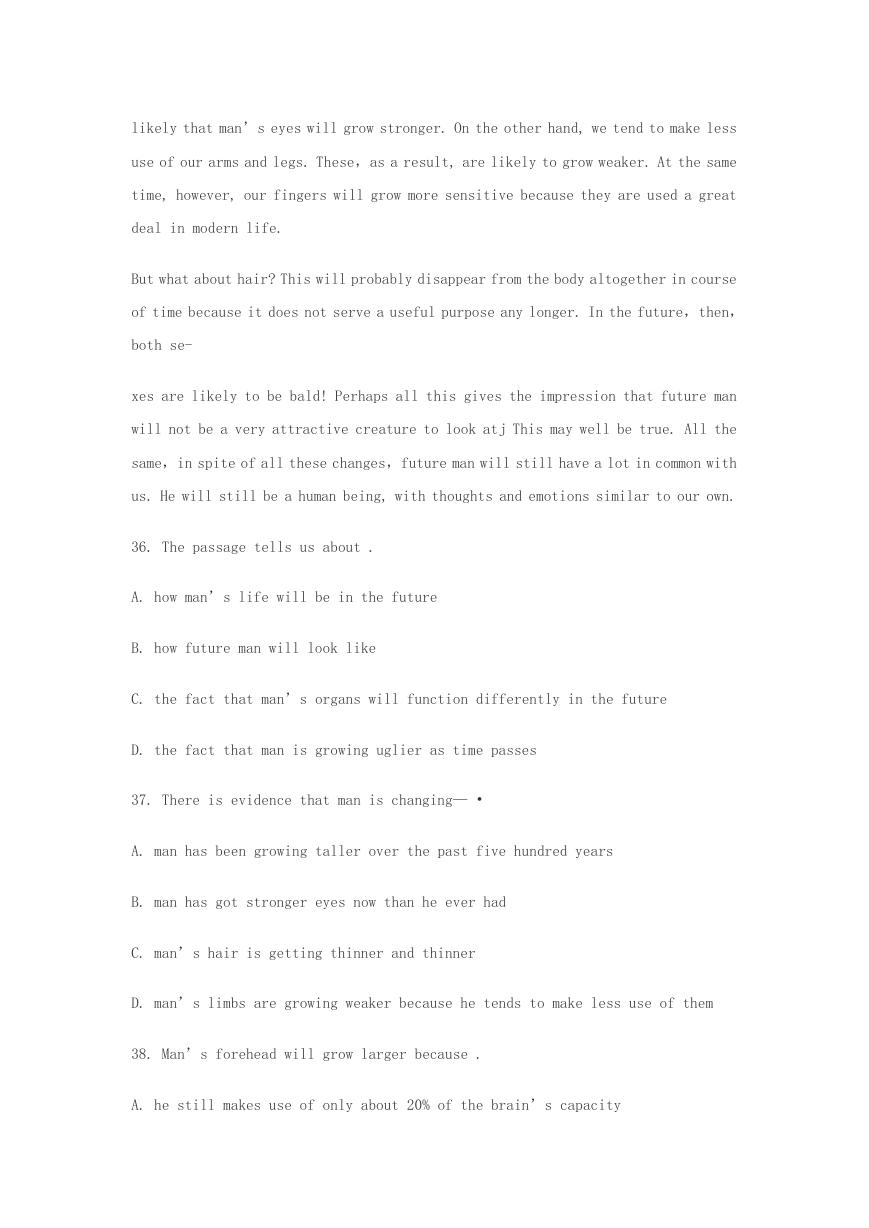








 2023年江西萍乡中考道德与法治真题及答案.doc
2023年江西萍乡中考道德与法治真题及答案.doc 2012年重庆南川中考生物真题及答案.doc
2012年重庆南川中考生物真题及答案.doc 2013年江西师范大学地理学综合及文艺理论基础考研真题.doc
2013年江西师范大学地理学综合及文艺理论基础考研真题.doc 2020年四川甘孜小升初语文真题及答案I卷.doc
2020年四川甘孜小升初语文真题及答案I卷.doc 2020年注册岩土工程师专业基础考试真题及答案.doc
2020年注册岩土工程师专业基础考试真题及答案.doc 2023-2024学年福建省厦门市九年级上学期数学月考试题及答案.doc
2023-2024学年福建省厦门市九年级上学期数学月考试题及答案.doc 2021-2022学年辽宁省沈阳市大东区九年级上学期语文期末试题及答案.doc
2021-2022学年辽宁省沈阳市大东区九年级上学期语文期末试题及答案.doc 2022-2023学年北京东城区初三第一学期物理期末试卷及答案.doc
2022-2023学年北京东城区初三第一学期物理期末试卷及答案.doc 2018上半年江西教师资格初中地理学科知识与教学能力真题及答案.doc
2018上半年江西教师资格初中地理学科知识与教学能力真题及答案.doc 2012年河北国家公务员申论考试真题及答案-省级.doc
2012年河北国家公务员申论考试真题及答案-省级.doc 2020-2021学年江苏省扬州市江都区邵樊片九年级上学期数学第一次质量检测试题及答案.doc
2020-2021学年江苏省扬州市江都区邵樊片九年级上学期数学第一次质量检测试题及答案.doc 2022下半年黑龙江教师资格证中学综合素质真题及答案.doc
2022下半年黑龙江教师资格证中学综合素质真题及答案.doc